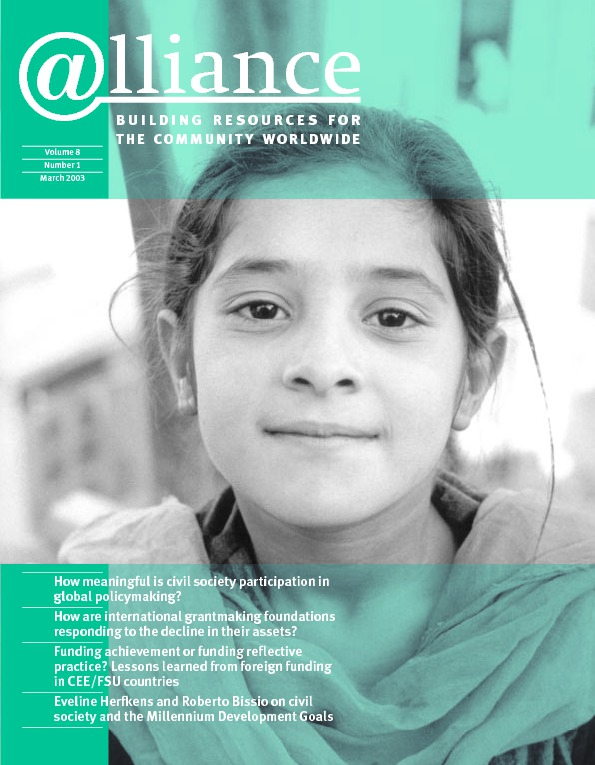At the time few commentators regarded the Russian Civic Forum as particularly significant. Many saw it as no more than a one-off showcase-type event. Over a year later, we can see that it was in fact the beginning of a new era in relations between the non-profit sector and the state. For the first time in Russian history, NGOs and state were living in one country – though not yet in the happy marriage some had hoped for.
Held in the Kremlin on 21-22 November 2001,[1] the Civic Forum gathered together over 5,000 NGO delegates from all over Russia. Although it was clearly conceived as a public event demonstrating the non-profit sector’s support for Putin’s government, it didn’t turn out like that. In fact, it was the first time that Russian NGOs had come together not to discuss their own problems but for open and honest discussion of major issues facing the country like army reform, poverty, deprivation and pollution. Numerous committees and so-called ‘negotiation platforms’ were formed after the Forum in order to continue dialogue with state officials on these issues.
A year of disappointment
But the year following the Civic Forum was to be a year of disappointment for NGO leaders. Idealistic expectations of friendly and open relations between NGOs and the state did not become a reality. Practical results of the continued dialogue have turned out to be minimal. More than half of the rapidly formed committees simply never came into being. Even where they did meet, they achieved little or were simply ignored by the government.
The law ‘On alternative army service’ is a classic example of successful partnership without results. The committee worked hard throughout the year to develop a draft law. Based on the best practice of Germany and other European countries, this would have allowed young people to choose humanitarian service if they did not want to join to the army because of their religion or values. The draft was presented to the parliament together with an alternative draft prepared by the Ministry of Defence, which meant that people who chose not to join the army would become more or less slaves of the army for four years.[2] Despite the open support of a number of government ministries and the President’s Administration for the NGO draft, the Ministry of Defence draft was adopted by the parliament.
More positively, apart from pushing the non-profit sector to begin discussing the problems of the country at large, the Civic Forum brought to light a genuine interest in several parts of the government in the views of NGOs. It helped to begin to form an expert community within the NGO sector that could prepare high-quality proposals for economic or social reforms. Public trust in NGOs increased, and it became clear that people were more inclined to trust NGOs that protected their rights than those that provided them with social assistance. NGOs thus began to understand that they need to represent citizens’ concerns and fight for citizens’ rights.
But the year after the Civic Forum also revealed some less positive aspects of the NGO sector:
- The NGO expert community is weak and small. It cannot compete either with government ministries or with experts from think-tanks and cannot therefore protect its views and positions.
- NGOs aren’t capable of acting together.
- They lack transparency and accountability and, more importantly, the will to become more transparent.
- Most NGOs still have a ‘slavery mentality’ and feel more comfortable begging than demanding.
The year also brought to light characteristics of the Russian state sector that are likely to undermine improvements in NGO-state relations: a ‘medieval ruler’ philosophy on the part of the top state elite (‘We know best what people need’) and corruption among the lower echelons, where it became increasingly clear that an interest in personal advancement was much stronger than any interest in the well-being of the country as a whole.
During the Civic Forum the non-profit sector and the state in Russia came close for the first time. The state hoped for a marriage where the non-profit sector would play the role of an old-fashioned wife hanging on her husband’s every word. NGOs saw themselves almost entering the Kremlin and signing policy papers themselves. Disappointment on both sides was the inevitable result.
Partnership between the non-profit sector and the state should be seen as a mutually beneficial effort based on a common goal of improving the country and realistic expectations of each other. The aftermath of the Civic Forum suggested that such a partnership is possible but much more time and thought will be needed to achieve it. The main stumbling blocks on the way are unrealistic expectations, the thirst for personal and political recognition, and the lack of transparency on both sides.
1 See Alliance, Vol 7, No 1.
2 The proposal was that people joined the same army regiments, just without guns. They would do construction and cleaning work, for four years rather than two.
Olga Alexeeva is Director of CAF Russia. She can be contacted at oalexeeva@cafrussia.ru





Comments (0)